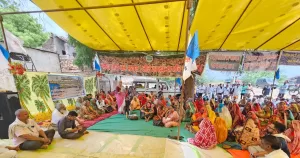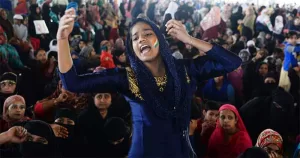At the time of writing the UK political scene has once again been engulfed by scandal. On this occasion said scandal has been precipitated by revelations of social events in Downing Street and other government locations during periods in which the country as a whole had been locked down as a response to the Coronavirus pandemic. Every few days seems to bring more revelations. A cheese and wine party in the Downing Street garden to which 100 people had been invited. An evening soiree at the Downing Street residence at a time when restrictions prohibited people from different homes gathering indoors. Another event which took place in the basement. DJs were hired. Suitcases of wine were brought in. The booze flowed, the food was aplenty. A merry time was had by all.
But to this was counterposed a different set of revelations. In the same month when government ministers had their drunken knees-up in the Downing Street garden – there was the case of the woman who had obeyed the regulations and by so doing was unable to say goodbye to her mother who died alone in a care home. There was the story of the eighteen year-old woman who had died from leukaemia five days before the Downing Street garden party, and whose family were unable to hold her hand in her last moments, because they too had chosen to obey the rules. In an act of bravery, respect and solidarity toward the broader community, they had said their goodbyes during a video call. Or the case of the older sister who couldn’t come and visit her younger, vulnerable brother who had Downs Syndrome in order to tell him in person that their beloved mother had passed away.
In the light of such revelations, Boris Johnson has done what one might expect of him; that is, he has reverted to type. For the sake of ambition and aggrandizement, career and prestige he has – his whole life long – lied both automatically and pathologically, and he would do so again now. The Prime Minster came before the cameras wearing his ‘humble face’, his ‘wounded face’; his eyes raised in an expression of pained supplication – he explained how mortified he was that any parties could have gone ahead in Downing Street without his knowledge.
And when it was revealed that he himself had attended just such a party, again the same face, the same look of wounded contrition: well yes, he had been there, but actually he had only ever assumed that it was ‘a work event’. When the improbability of this was explained to him, he made the most ‘humble’, ‘wounded’ face of all; none of his staff had warned him that his actions were in violation of the rules, so he really couldn’t have known. Fair enough. Except, perhaps, for the fact that those same rules had been crafted by Boris Johnson himself.
The reaction on the part of the public was predictable. Utter, utter rage. For the sheer hypocrisy of it. For the lack of imagination, for the banality of the excuses which were then trotted out to cover it up. And most of all, for the man at the top; the serial liar, the person capable of telling the most flagrant of untruths with an unblinking, poker-face. All in the service of an ambition which knows no limits and simply can’t be checked by loss and tragedy and death, at least not if those things are endured by the plebeian masses he feels it is his destiny to rule.
And yet, while the public mood of outrage and anguish is more than understandable it also misses something crucial. The anger toward the hypocrisy of the politicians – those who make the rules and go onto break them – misses something more fundamental to any class society, i.e. a society which is stratified by great divisions in wealth and privilege.
If, for instance, you or I were to break the speed limit and get flashed by a camera, that £120 fine we might receive could provide a painful hit to the household economy for that month. But if you are a millionaire, a £120 fine is in essence meaningless; it has no significant impact on your situation. Though you are subject to the same laws of the road as everyone else, those laws cease to have bearing in their capacity as laws – or to say the same, they are rendered impotent. As the great Greek statesman Solon remarked, more than two millennia ago, ‘Laws are like spider’s webs: If some poor weak creature comes up against them, it is caught; but a big one can break through and get away.’
Sometimes there are caveats in place to make sure the emissaries of the elite avoid reprisals for the crimes they carry out. To return to the rules of the road again, consider the case of the nineteen year old British man Harry Dunn. Dunn was killed outright when his motorbike was involved in a head-on collision with a car driven by one Anne Sacoolas. The latter happened to be the wife of a US diplomat who was staying at a nearby airbase. Dunn’s family allege that Sacoolas had been driving on the wrong side of the road when the collision took place, and though this hasn’t been denied, Sacoolas was able to claim diplomatic immunity and hightail it out of the country before any investigation could be properly carried out.
Sacoolas’ lawyer made a brief statement of regret about the ‘terrible but unintentional accident’ before making it clear Sacoolas had no intention whatsoever of returning to the UK in order to be held accountable for the loss of the young man’s life. To this day, the US refuses to extradite her. And to this day, Dunn’s family continue to campaign for justice. But the hubris and lack of basic decency on the part of Sacoolas is only conceivable from the purview of a social world in which a select minority are abstracted from the vast majority in terms of political power and financial privilege. For that reason, it is increasingly difficult for the same elite to imagine how that majority might partake in a level of humanity similar to themselves. The lives of their children are never quite so significant, the devastation of their grief never quite so acute.
The legislation which is crafted by lawmakers often reflects the same economic and social divide. In the US, the extent to which the interests of the wealthy have penetrated the mechanisms of statecraft is perhaps now more pronounced than ever before. As Jeffrey St Clair notes, ‘America’s 661 billionaires pumped $1,200,000,000 into the 2020 elections, double what they contributed in 2016, and 39 times more than they contributed before Citizens United was decided 12 years ago.’
In addition, those NGOs which once acted as a bulwark to large moneyed interests have more and more been absorbed into the Washington political machine: ‘since at least the early ‘90s, the once-powerful network of civil rights, labor, feminist and environmental groups has been steadily co-opted by the Democratic Party. Like the party itself, the liberal NGOs have become less and less accountable to their own members, as they stuff their bank accounts with money from DNC-linked foundations and large donors.’
Seen from this perspective, it is hardly surprising that many of ‘the most cherished landmarks of American liberalism – reproductive rights, workplace safety, voting rights and the regulatory power of the state – are being shredded’ proactively by Republican politicians but with the quiescence of their Democratic counterparts.
Following the murder of George Floyd by a racist white cop at the beginning of March 2020, the US was engulfed by protest. By early June that same year over 10,000 BLM protestors had been arrested in a massive repression which saw ‘police forces regularly use pepper spray, rubber bullets, teargas and batons on protesters, media and bystanders.’ Later, it was reported that hundreds of these protesters were languishing in prison facing ‘tacked charges and threats of life sentences. Others have been charged with “assaulting” police officers where there’s no evidence of violence and no reports of injuries. Some arrested protesters have been transferred to immigration authorities.’
This mass mobilisation of the police against the public saw brutal physical violence accompanied by a wave of incarcerations. But compare this with the same state’s response to the financial crash of 2007-8. The crash was precipitated not only by the recklessness of casino capitalism driven by billionaire financiers who were happy to roll the wheel while gambling the fates of billions across the globe. It was also underpinned by flagrant illegality; executives of companies such as Goldman Sachs, in breach of the law, had gone about ‘falsely assuring investors that securities it sold were backed when … [they] … knew that they were full of mortgages that were likely to fail’. The consequences of such behaviour were catastrophic – 9 million Americans lost their jobs, at least 10 million lost their homes and within four years 46.5 people in the US were living in poverty.
How many CEOs were pepper-sprayed and snatched from the streets? How many of them were teargassed and beaten with batons for the crimes? How many executives had rubber bullets pumped into their soft, flabby, foie gras derrières? The answer – depressingly – is nil. In fact, only one top banker (Kareem Serageldin) was actually sent to prison for their role in the crash. As for the rest – the whole rotten clasp of them – we know all too well what happened.
First, they were bailed out by the state to the tune of hundreds of billions of tax-payer cash. Then they went on to reap massive bonuses as the divider between wealth and poverty became more exacerbated than ever before. To the point at which in 2021, Reuters noted, the prime movers of the US financial system – the same names who have left the public that 2008 legacy of debt, poverty and immiseration – have gone on to pay their top investment bankers the biggest bonuses yet. Goldman Sachs, for instance ‘increased its annual bonus pool for top-performing investment bankers by 40% to 50%’ while ‘JPMorgan Chase, the largest U.S. bank, increased its annual bonus pool for top-performing investment bankers by 30% to 40%’.
For all of this, one cannot but question the principle of equality that is sanctified by modern law. Lady Justice is often depicted as being blind; meaning that her rules are meant to apply to everyone across the board and should not be modified in accordance with race, gender or class. And yet, in societies which are so stratified by the extremes of wealth and poverty, can such equality ever truly be realised?
In the 19th century, the French writer, poet and novelist Anatole France wrote of how ‘the law, in its majestic equality, forbids all men to sleep under bridges, to beg in the streets and to steal bread – the rich as well as the poor.’ His point, of course, was an ironic one; the rich man is never going to be in a position where he is sleeping under the bridge in the first place, for he will always be able to afford a night in a luxury hotel; likewise the rich are hardly likely to be in a position where they need to filch loaves of bread, for they have the means to dine in the finest restaurants.
This disparity between rich and poor shows up in the statistics surrounding incarceration more generally. In the case of the US, a 2015 study showed how, in the previous year, the median income of all incarcerated people was $19,185 – and this was ‘41% less than non-incarcerated people of similar ages.’ Another report develops the same contrast between rich and poor, revealing that – in the period from 2009 – 2013 – the data showed how ‘boys born into households in the bottom 10% of earners are 20 times more likely to be in prison on a given day in their early 30s than children born into the top 10%.’ The data reveals vividly what the same study describes as a ‘poverty to prison pipeline’ – whereby low income often provides a powerful impetus to future incarceration.
For the poor regularly make more viable targets for prosecution; they don’t have money for decent legal representation and any legal aid is often indifferent and inadequate, more about processing them through the system rather than mounting any genuine defence of their rights. Many cannot afford the cash for bail and the fact of having to languish in custody before a trial also inhibits the quality of the defence they might enjoy. Things like witness tracing and forensics are nearly always beyond their ken which as well impacts the effectiveness of any legal defence.
And last, but not least, there is often a financial incentive on the part of the state itself which comes from keeping vast numbers of the poor incarcerated. A 2016 expose discovered how, in the US, ‘approximately 39% of the nationwide prison population (576,000 people) is behind bars with little public safety rationale.’ – i.e. the crimes in question were almost all non-violent, lower-level offences and this section of prisoners ‘should not be in prison. And yet, this same class of prisoners provide an integral source of labour that can help fill the state coffers and provide a key incentive for capital investment in a prison system that has endured decades of privatisation.
In 2011 the US Supreme Court ordered the state of California to drastically reduce its prison population as a result of overcrowding which had ‘resulted in extreme suffering and even death, a deprivation of the inmates’ rights that violates the Constitution’. The state of California appealed against this judgement, but what was particularly interesting was the rationale for their appeal. They argued that the prison population shouldn’t be reduced because to do so would deplete the pool of cheap prison labour.
And speaking of costs, it only remains to say that white-collar crime is the most cost-heavy of all. In the US, in 2020, it was estimated that $56 billion were lost to fraud alone. The FBI estimate that while the annual cost of street crime hovers around the $15 billion mark, the cost of white-collar crime reaches the stratospheric figure of more than 1 trillion per year.
To return to Downing Street, now thrumming with colours and disco globes, humming under all the weight of the booze and drugs and parties, its octogenarian politicians spilling out into the streets, brawling drunkenly over the issue of the Irish Border. I exaggerate somewhat, of course, but there is a more serious point to be made here. The way in which the law often comes to oppress those at the bottom and yet fortify those at the top has been illustrated in the clearest of ways by the Johnson debacle. In attending some of these social gatherings, Johnson not only broke corona regulations, he also went on to lie about it. He is therefore liable to criminal prosecution. And yet, when the police were asked if they were going to prosecute members of the government for such breaches, the police refused, saying they ‘relied on the government’s assurances that no rules had been broken’. (I wonder if the police would relent in quite the same way had a suspected shoplifter or bank robber ‘assured’ them he or she had broken no rules)
The issue here isn’t one of simple corruption or moral hypocrisy. It is an expression of the structural inequality which is inherent to capitalism more broadly. It is difficult in the extreme for the armed wing of the state to take any effective action against the repository of political and bureaucratic power which sets it into motion in the first place. Of necessity, the law makers are so often the law breakers.
(Tony McKenna’s journalism has been featured by Al Jazeera, Salon, The Huffington Post, ABC Australia, New Internationalist, The Progressive, New Statesman and New Humanist. He has also written several books. Courtesy: CounterPunch.)




